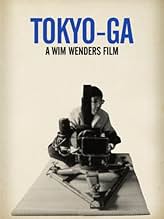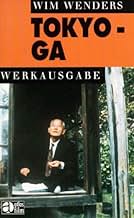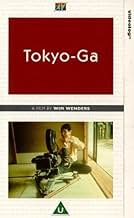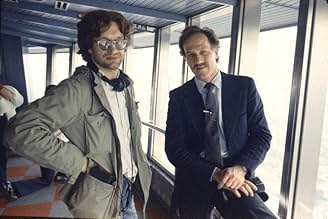Tokyo-Ga
- 1985
- Tous publics
- 1h 32min
NOTE IMDb
7,3/10
3,8 k
MA NOTE
Ajouter une intrigue dans votre langueMoved by the work of director Yasujirô Ozu, Wim Wenders travels to Japan in search of the Tokyo seen in Ozu's films.Moved by the work of director Yasujirô Ozu, Wim Wenders travels to Japan in search of the Tokyo seen in Ozu's films.Moved by the work of director Yasujirô Ozu, Wim Wenders travels to Japan in search of the Tokyo seen in Ozu's films.
- Réalisation
- Scénario
- Casting principal
Avis à la une
I first went to Japan in 1986 as a high school exchange student. I had been studying about Japan for the past 6 years and was very excited to finally go there to see it in person. Wim Wenders was in a similar situation. He had fallen in love with a particular Japanese film-maker Ozu Yasujiru. Wim had been influenced from an early age by Ozu's work, and he decided to go to Japan while in the middle of making "Paris, Texas." During the break in the making of the film in Los Angeles, Wim boarded a 747 and flew across the Pacific to Tokyo, a place he had never been to before. What we get to see when we watch this film, is not only an interview with the cameraman that worked for Ozu for 25 years, but also Wim's personal discovery of Japan. Much of the film is just straight documentary-type footage accompanied with some pretty weird music. Riding in a taxi at night. Riding in a train at night. Following a little boy who is too tired to walk in the underground shopping mall with his mom, and decides to just sit down. The Cherry Blossom Festival picnics in Tokyo, the dancers at Harajuku on Sundays. A particularly fascinating scene is of a company that manufactures the wax food models you see outside most restaraunts in Japan. Overall, a wonderful film for anyone who loves Japan or is just interested in it. I rate this film among Wim's best works. If you can find it, rent it.
This had been on my watchlist for ages, but after watching the excellent Perfect Days, it became a top priority. Both have Wim Wenders exploring Japan, though Tokyo-Ga is a documentary, and one with a surprising focus on Yasujiro Ozu. When Wenders is focused on Ozu, and interviewing people who knew the legendary filmmaker, I think Tokyo-Ga is at its best.
There are other sections dedicated to just exploring technology and life in Japan, but these parts come up a little short at times. Wenders' narration can feel a little surface-level at times, or at least not as exceptional as Werner Herzog's would be, if he handled a film like this (he does have a cameo appearance here though, which was cool).
It's a pretty good watch. It doesn't do for the documentary genre what Perfect Days does for non-documentary films, by any means, but it's still fairly good for what it is, and was relatively interesting to me throughout.
There are other sections dedicated to just exploring technology and life in Japan, but these parts come up a little short at times. Wenders' narration can feel a little surface-level at times, or at least not as exceptional as Werner Herzog's would be, if he handled a film like this (he does have a cameo appearance here though, which was cool).
It's a pretty good watch. It doesn't do for the documentary genre what Perfect Days does for non-documentary films, by any means, but it's still fairly good for what it is, and was relatively interesting to me throughout.
Wim Wenders attempts to turn his first trip to Japan into a homage to Ozu and an exploration of Japanese modernity, contrasted with the images of a bygone era glimpsed in Tokyo Monogatari.
This is a deeply personal film, an unabashed pilgrimage by Wenders in search of his muse. His rambling narration, impenetrable at times, offers little insight on Japan. What first-time visitor can encapsulate a city as complex as Tokyo? The film works better on the subject of Ozu, the interviews with actor Chishu Ryu and cinematographer Yuuharu Atsuta offering glimpses of Ozu the man behind the icon. They also reveal the affecting power of cinema, both men clearly humbled and moved by the experience of collaborating with Ozu. The bottom line, however, is that this is a film about Wim Wenders, about his nascent stage as a filmmaker and how that came to fruition in the way it did. Fans of Wenders, rather than Ozu or Japanophiles, are the audience for this film.
Technically the film offers up a few gifts, the prime example being a glimpse of the craftsmanship that goes into the making of the ubiquitous wax food in restaurant display windows. Unlike the weekend rockabilly dancers, crowded commuter trains, or oppressive concrete and steel structures, this sequence brings something both long-term residents and those ignorant of Japan will find fresh and illuminating. Unfortunately, elsewhere the film is interspersed with interminable footage of being in a taxi, being in a train, men hitting golf balls... all protracted shots for no other reason than to add a touch of Ozu to the film. A funky, slightly disturbing score helps make these sequences bearable.
Tokyo-Ga is recommended for Wenders fans, and perhaps as nostalgia for anyone who spent a brief time in Japan in the mid-Eighties.
This is a deeply personal film, an unabashed pilgrimage by Wenders in search of his muse. His rambling narration, impenetrable at times, offers little insight on Japan. What first-time visitor can encapsulate a city as complex as Tokyo? The film works better on the subject of Ozu, the interviews with actor Chishu Ryu and cinematographer Yuuharu Atsuta offering glimpses of Ozu the man behind the icon. They also reveal the affecting power of cinema, both men clearly humbled and moved by the experience of collaborating with Ozu. The bottom line, however, is that this is a film about Wim Wenders, about his nascent stage as a filmmaker and how that came to fruition in the way it did. Fans of Wenders, rather than Ozu or Japanophiles, are the audience for this film.
Technically the film offers up a few gifts, the prime example being a glimpse of the craftsmanship that goes into the making of the ubiquitous wax food in restaurant display windows. Unlike the weekend rockabilly dancers, crowded commuter trains, or oppressive concrete and steel structures, this sequence brings something both long-term residents and those ignorant of Japan will find fresh and illuminating. Unfortunately, elsewhere the film is interspersed with interminable footage of being in a taxi, being in a train, men hitting golf balls... all protracted shots for no other reason than to add a touch of Ozu to the film. A funky, slightly disturbing score helps make these sequences bearable.
Tokyo-Ga is recommended for Wenders fans, and perhaps as nostalgia for anyone who spent a brief time in Japan in the mid-Eighties.
the footage is lush and gorgeous, German camera-work of the 70s-80s of the highest caliber. but...the content I found ... appalling! it's been 15 or so years since I saw it and haven't thought about it in a long time, but was just reminded while suffering through this documentary about a feature film called "Jew Süss" ... but my impression of the overall tone is ineradicable . . . I have to admit I'd entirely forgotten the "Ozu love letter" element of the whole thing.
more enjoyable is a documentary about designer Yojhi Yamamoto that I saw at about the same time in this big Wim Wenders retrospective. another film that was a very sweet standout was "A Trick of the Light" about film pioneers whose work was eclipsed by developments of Lumiere in France starring Udo Kier, which I recommend highly.
Wim Wenders...is kind of a shallow filmmaker in my estimation. As with Tokyo Ga I'm sure he had no idea what a potentially offensive film he made. I remember particularly a sequence about some sort of Japanese pinball game that is insanely popular there, his reflections upon which seemed the fruit of a (lack of) intelligence of the sort that characterizes also that cinema excreta "Lost in Translation". the deep meaning of which seems to be "god what a bunch of freaks these Japs are for not speaking English and not modeling themselves after the oh so kewl savvy ironic US population what in god's name is wrong with them?!
more enjoyable is a documentary about designer Yojhi Yamamoto that I saw at about the same time in this big Wim Wenders retrospective. another film that was a very sweet standout was "A Trick of the Light" about film pioneers whose work was eclipsed by developments of Lumiere in France starring Udo Kier, which I recommend highly.
Wim Wenders...is kind of a shallow filmmaker in my estimation. As with Tokyo Ga I'm sure he had no idea what a potentially offensive film he made. I remember particularly a sequence about some sort of Japanese pinball game that is insanely popular there, his reflections upon which seemed the fruit of a (lack of) intelligence of the sort that characterizes also that cinema excreta "Lost in Translation". the deep meaning of which seems to be "god what a bunch of freaks these Japs are for not speaking English and not modeling themselves after the oh so kewl savvy ironic US population what in god's name is wrong with them?!
Tokyo-Ga (1985) was written and directed by Wim Wenders. This full-length documentary is a tribute to Japanese director Yasujirô Ozu. It's included as a special feature in the Criterion Collection edition of Ozu's movie Late Spring.
Wenders is a talented German New Age director, who admired Ozu's work. He went to Tokyo to learn more about the city and about Ozu.
The movie has a real dichotomy. Wenders interviews actor Chishû Ryû and cinematographer Yûharu Atsuta at length. Ryû appeared in almost all of Ozu's films, and Atsuta was his chief camera operator.
Each of them (separately) tells the same story. Ozu knew what he wanted, and he was prepared to go to any lengths to get it. Neither man always understood what Ozu was thinking. They did what he told them to do. Sometimes Ozu was happy, sometimes he wasn't. Both men said that they couldn't understand why something was right or wrong. They kept doing the same scene until Ozu was satisfied. So, in a way, Ozu was a tyrant. However, he was a very polite and friendly tyrant, and he directed great film after great film. Both men are firm in their love and admiration for him.
The other part of the film consists of Wenders wandering through Tokyo and ending up at a pachinko parlor, a golf range, and a factory where they make plastic "food" items to be displayed in restaurant windows.
Wenders' view of Tokyo is that it's a harsh, overcrowded city with no charm. That's what he shows us. Of course, no one can capture a city in part of one documentary. Possibly another director would give us a different view.
I think this documentary is worth seeing if you want to learn more about how Ozu worked and how he accomplished as much as he did. It's also interesting to see a foreigner's view of this city of nine million people. It's certainly not a must-see movie, but I'm glad I saw it.
Tokyo-Ga has a solid 7.4 IMDb rating. I thought it was even better than that, and rated it 9.
Wenders is a talented German New Age director, who admired Ozu's work. He went to Tokyo to learn more about the city and about Ozu.
The movie has a real dichotomy. Wenders interviews actor Chishû Ryû and cinematographer Yûharu Atsuta at length. Ryû appeared in almost all of Ozu's films, and Atsuta was his chief camera operator.
Each of them (separately) tells the same story. Ozu knew what he wanted, and he was prepared to go to any lengths to get it. Neither man always understood what Ozu was thinking. They did what he told them to do. Sometimes Ozu was happy, sometimes he wasn't. Both men said that they couldn't understand why something was right or wrong. They kept doing the same scene until Ozu was satisfied. So, in a way, Ozu was a tyrant. However, he was a very polite and friendly tyrant, and he directed great film after great film. Both men are firm in their love and admiration for him.
The other part of the film consists of Wenders wandering through Tokyo and ending up at a pachinko parlor, a golf range, and a factory where they make plastic "food" items to be displayed in restaurant windows.
Wenders' view of Tokyo is that it's a harsh, overcrowded city with no charm. That's what he shows us. Of course, no one can capture a city in part of one documentary. Possibly another director would give us a different view.
I think this documentary is worth seeing if you want to learn more about how Ozu worked and how he accomplished as much as he did. It's also interesting to see a foreigner's view of this city of nine million people. It's certainly not a must-see movie, but I'm glad I saw it.
Tokyo-Ga has a solid 7.4 IMDb rating. I thought it was even better than that, and rated it 9.
Le saviez-vous
- Citations
Wim Wenders: It felt good just to look out the window. If only it were possible to film like that, I thought to myself, like when you open your eyes sometimes just to look without wanting to prove anything.
- ConnexionsFeatured in De zee die denkt (2000)
Meilleurs choix
Connectez-vous pour évaluer et suivre la liste de favoris afin de recevoir des recommandations personnalisées
- How long is Tokyo-Ga?Alimenté par Alexa
Détails
Contribuer à cette page
Suggérer une modification ou ajouter du contenu manquant
























